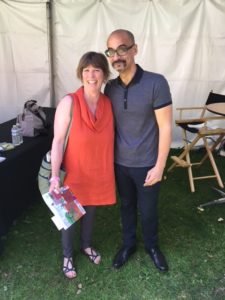This novel by the African Nobel-prize winner Abdulrazak Gurnah is a dream story — a well-told, riveting plot, filled with extraordinary characters and adventures.
Tag: fiction
Cousin Pons to the rescue

I was super excited to pick up three paperbacks at off-beat independent bookstores recently: The Dog of the South by Charles Portis, The Human Stain by Philip Roth and Cruising Paradise by Sam Shepard. I read the Roth book and did not like the plot or characters at all, but his writing style captured my attention. I bet he was never edited because he goes on and on. Anyway, since he died kind of recently, I wanted to remind myself why so many people think he’s great. I’m not a fan.
I like The Dog of the South mostly because it’s funny, but now that I’m further into it, the story is feeling superficial, as if it was written really fast. Only the Sam Shepard book is surviving my picky judgement. It’s got humor, good writing, unpredictable characters and … a lot of feeling.
In the middle of a recent hot Sunday, I wanted not just good but great writing to help me escape into another world, and I did not trust any modern writer to have this ability. So I turned to the shelf where I keep a lot of books from my parents’ house. These books are dusty and old, really old.
I pulled out Cousin Pons by De Balzac. Some people are crazy for him, so I opened it up.
Divine writing. Superb.
I’m swept up into the minute description of the curious clothing worn Sylvain Pons as he walks down the boulevard to the amusement of Parisian onlookers. This goes on for pages and it’s utterly compelling. I can’t break down the elements of this style, but I am so happy, and relieved, to be carried along by such a fine writer.
I will let you know how it holds up as I keep going, but something tells me it will.
Junot Diaz

“Fools talk about diversity, but they can’t even imagine LA.” That was the first thing Junot Díaz said when he was introduced by LA Times writer Carolina Miranda at the LA Book Festival. It was just the beginning of a great hour-long talk.
I am sorry he’s disappeared from the landscape and hope it is temporary. He is too good a writer, and we can’t afford to lose his voice.
He is, of course, the author of the 2008 Pulitzer Prize-winning novel The Brief Wondrous Life of Oscar Wao. When I heard him at the book fesitval, I noticed that he could be measured and thoughtful, then suddenly urgent. He offered a political perspective about dictatorships one moment, then an intensely personal memory of being poor, the next. His mind is extraordinarily quick, and he fluidly shifted from English to Spanish and back again. He referred to his earthshaking piece in the New Yorker but did not want to discuss it as there were children in the audience.
He was there mostly to talk about his new children’s book Islandborn, with illustrations by Leo Espinoza. Again, I hope that this book gets the attention and audience that it deserves.
It’s about a little Afro-Caribbean girl named Lola who can’t remember the island where she was born because she was too little when she was brought to the U.S. by her parents. So she sets out to ask members of her extended family to describe the island so that she can “remember.” As they give her bits of information, she imagines for herself what these memories mean, adding her own whimsical interpretations. It’s a delightful story that feels very true to a child’s logic.
Díaz explained why it took him ten years to write the book — he didn’t want to be cute or to take shortcuts just because his audience would be children. How many writers are good enough to make those choices?
You have to be 100 percent faithful to the reader. So, his children’s book includes a monster—it comes up as a bad memory from one of the adults who’d left the island years before. In his talk, Díaz explained that the monster refers to the cruel dictator, Rafael Trujillo, who reigned for decades in the Dominican Republic.
In his exchanges with Carolina Miranda and audience members who asked questions, his compassion for writers, students and readers was evident. We need him.
Great first line
 “But I never finished telling you about the two men.”
“But I never finished telling you about the two men.”
This is one of my favorite first lines because it sounds like there’s been a whole conversation going on before this story starts. It’s from the Denis Johnson story called “The Other Man.”
Generally, I don’t prefer crude writers who glamorize violence and misery, which are often accompanied by ill treatment of women, but some, like Johnson, include redemption in their writing, and that I love.
One of the remaining bookstores in L.A. called Book Soup is holding a tribute to Denis Johnson on Thursday evening, 7 p.m. I’m going!

